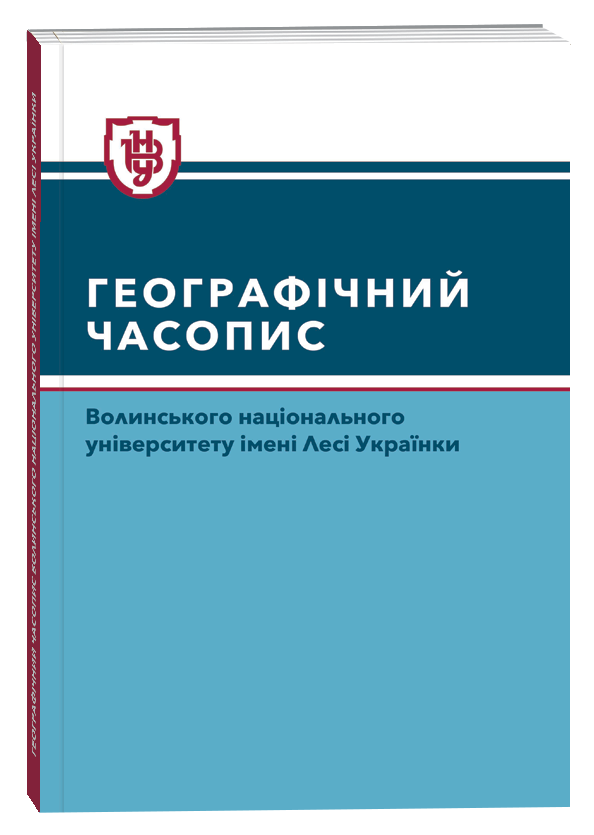РОЗВИТОК КОНЦЕПЦІЇ МІСЬКОЇ РЕЗИЛЬЄНТНОСТІ: РОЛЬ ТА ПЕРСПЕКТИВИ В ГЕОГРАФІЧНІЙ НАУЦІ
DOI:
https://doi.org/10.32782/geochasvnu.2024.4.08Ключові слова:
резильєнтність, стійкість, географія, міська резильєнтність, геоурбаністика, сталий розвитокАнотація
У статті розкривається актуальність поняття «резильєнтність» для складних систем на тлі глобального запиту щодо підвищення стійкості перед обличчям екологічної, соціально-економічної та політичної невизначеності й ризику, що привертає увагу науковців та осіб, які приймають рішення, у різних дисциплінах, секторах і масштабах. Далеко не всі аспекти цієї проблеми, на нашу думку, достатньо висвітлені й опрацьовані з географічних позицій. Тож було проаналізовано витоки концепції, її розвиток у часі та виявлено аспекти застосування поняття в різних сферах повсякденного існування. До уваги пропонуються результати опрацювання наукового доробку вітчизняних і зарубіжних учених-фахівців у цій галузі. У роботі увагу приділено й суспільно-географічному аналізу чинників формування міської резильєнтності як однієї зі складових резильєнтності, також визначено перспективні аспекти розвитку цієї похідної від загальної концепції. Стаття завершується виокремленням поняття «резильєнтність» із географічного погляду, а також роздумами над майбутніми перспективами концепції з огляду на її присутність у перерахованих царинах науки.
Посилання
Гродзинський М.Д. Стійкість геосистем до антропогенних навантажень. Київ : Лікей, 1995. 233 с.
Лазос Г.П. Резільєнтність: концептуалізація понять, огляд сучасних досліджень. Актуальні проблеми психології. 2018. Т. 3, вип. 14. С. 26–64.
Національна стійкість України: стратегія відповіді на виклики та випередження гібридних загроз : національна доповідь. Київ : Ін-т політичних і етнонаціональних досліджень ім. І.Ф. Кураса НАН України, 2022. 552 с.
Arthur E., Schjønning P., Moldrup P., de Jonge L.W. Soil resistance and resilience to mechanical stresses for three differently managed sandy loam soils. Geoderma. 2012. № 173–174. P. 50–60. DOI: https://doi.org/10.1016/j.geoderma.2012.01.007
Boehm J., Salmanian W., Wallance D. A technology survival guide for resilience. URL: https://www.mckinsey.com/capabilities/risk-and-resilience/our-insights/a-technology-survival-guide-for-resilience (дата звернення: 15.06.2024).
Climate Change 2022: Impacts, Adaptation and Vulnerability. Contribution of Working Group II to the Sixth Assessment Report of the Intergovernmental Panel on Climate Change. Cambridge University Press, Cambridge, UK and New York, NY, USA. 2023. P. 3–33. DOI: https://doi.org/10.1017/9781009325844.001.
Herrman H., Stewart D.Е., Diaz-Granados N., Berger Е.L., Jackson B., Yuen T. What is Resilience? The Canadian Journal of Psychiatry. 2011. № 56 (5). P. 258–265. DOI: https://doi.org/10.1177/070674371105600504.
Meerow S., Newell J.P., Stults M. Defining Urban Resilience: A Review. Landscape and Urban Planning. 2016. № 147. P. 38–49. DOI: https://doi.org/10.1016/j.landurbplan. 2015.11.011.
Rampp B., Endreß M., Naumann M. Resilience in Social, Cultural and Political Spheres. Springer International Publishing. 2022. DOI: https://doi.org/10.1007/978-3-658-15329-8.
Resilience. URL: https://www.undrr.org/terminology/resilience (дата звернення: 15.06.2024).
Schoon M. A short historical overview of the concepts of resilience, vulnerability, and adaptation. URL: http://michaelschoon.files.wordpress.com/2011/05/historical_critique-of-resilience-working-paper.pdf (дата звернення: 15.06.2024).
Shand M. Understanding and building resilience with art: A socio-ecological approach. Research Online. Edith Cowan University. 2014. URL: https://ro.ecu.edu.au/theses/1402(дата звернення: 15.06.2024).
Urban Resilience: Methodologies, Tools and Evaluation. Theory and Practice. Springer International Publishing. 2022. DOI: https://doi.org/10.1007/978-3-031-07586-5.
Vayda А.P., McCay B.J. New Directions in Ecology and Ecological Anthropology. Annual Review of Anthropology. 1975. № 4. P. 293–306. DOI: https://doi.org/10.1146/annurev.an.04.100175.001453.
Weichselgartner J., Kelman, I. Geographies of resilience: Challenges and opportunities of a descriptive concept. Progress in Human Geography. 2015. № 39 (3). P. 249–267. DOI: https://doi.org/10.1177/0309132513518834.
Wieland A., Durach C.F. Two perspectives on supply chain resilience. Journal of Business Logistics. 2021. № 42 (3). P. 315–322. DOI: https://doi.org/10.1111/jbl.12271.
What is community resilience and why does it matter? URL: https://urbanfootprint.com/community-resiliencemeaning/(дата звернення: 15.06.2024).







